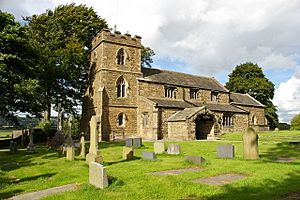St James' Church, Altham facts for kids
Quick facts for kids St James' Church, Altham |
|
|---|---|

St James' Church, Altham, from the southwest
|
|
| Lua error in Module:Location_map at line 420: attempt to index field 'wikibase' (a nil value). | |
| OS grid reference | SD 772,331 |
| Location | Altham, Lancashire |
| Country | England |
| Denomination | Anglican |
| Website | St James, Altham |
| History | |
| Status | Parish church |
| Architecture | |
| Functional status | Active |
| Heritage designation | Grade II* |
| Designated | 17 December 1968 |
| Architect(s) | Thomas Hacking (1859 additions and alterations) Paley and Austin (chapel rebuilt) |
| Architectural type | Church |
| Style | Gothic, Gothic Revival |
| Specifications | |
| Materials | Sandstone, stone slate roofs |
| Administration | |
| Parish | Altham with Clayton le Moors |
| Deanery | Accrington |
| Archdeaconry | Blackburn |
| Diocese | Blackburn |
| Province | York |
St James' Church is a special old building in Altham, a village in Lancashire, England. It's an active church for the Anglican faith, which is a type of Christian church. It belongs to the Diocese of Blackburn, which is like a church district. This church is so important that it's officially protected as a Grade II* listed building. This means it's a very special historical place.
Contents
History of St James' Church
St James' Church was first built way back in 1140. It was originally named after Saint Mary. Some parts of the church you see today are from the 1400s and 1500s. The church tower was added in 1859. At the same time, the chancel, which is the area around the altar, was rebuilt. A person named Thomas Hacking made these changes. Later, in 1881, a chapel was rebuilt by famous architects called Paley and Austin from Lancaster.
Church Architecture
Outside the Church
St James' Church is built from rough sandstone and has a roof made of stone tiles. It has a main area called a nave, with aisles on both the north and south sides. There's also a porch on the south side and a chancel. The church has a short, three-story tower at the west end. This tower is built in a style called Perpendicular Gothic.
The tower has an arched doorway at the bottom. Above the doorway is a window with two sections. Higher up, there are openings for bells, also with two sections. The very top of the tower has a decorative, castle-like wall called a battlement. All the windows along the sides of the church are rounded at the top and have three sections.
The south porch has a pointed roof. Inside the porch, one of the side benches includes a piece of an old Norman font. A font is a basin used for baptisms. In 2008, this old Norman font was moved inside the church. Its design, with eight hidden vertical pillars, suggests it might be even older, possibly from Saxon times.
Inside the Church
Inside St James' Church, there is a small gallery at the west end. The main arches, called arcades, are supported by eight-sided pillars. These arches are rounded. In the north wall of the chancel, there's a special basin from the late Middle Ages called a piscina. It was used for washing sacred vessels.
On the south wall, you can see the re-positioned tympanum of a Norman door. A tympanum is a decorated space above a doorway. The church also has an eight-sided font that was a gift from the abbot of Whalley Abbey. This font has carvings of the Instruments of the Passion, which are symbols related to the story of Jesus.
The church has four special painted boards from the 1800s called hatchments. These boards show the coats of arms of important families. There are also memorial tablets on the walls from the 1700s and 1800s. The church still has its original box pews from 1859. These are like enclosed seating areas.
You can see beautiful stained glass windows in the church. One in the southeast aisle is from the mid-1800s and was made by Hardman & Co. Another window in the northeast aisle is from the early 1900s by Shrigley and Hunt. The church also has a two-manual organ built around 1859 by John Laycock. This organ is so special that it has received a Historic Organ Certificate.
Churchyard Features
The churchyard around St James' Church is a peaceful place. It contains the graves of three British soldiers who died in World War I. There is also the grave of a Canadian sailor who died during World War II. These graves are cared for by the Commonwealth War Graves Commission.
See also
- Grade II* listed buildings in Lancashire
- Listed buildings in Altham, Lancashire
- List of ecclesiastical works by Paley and Austin
 | Sharif Bey |
 | Hale Woodruff |
 | Richmond Barthé |
 | Purvis Young |

